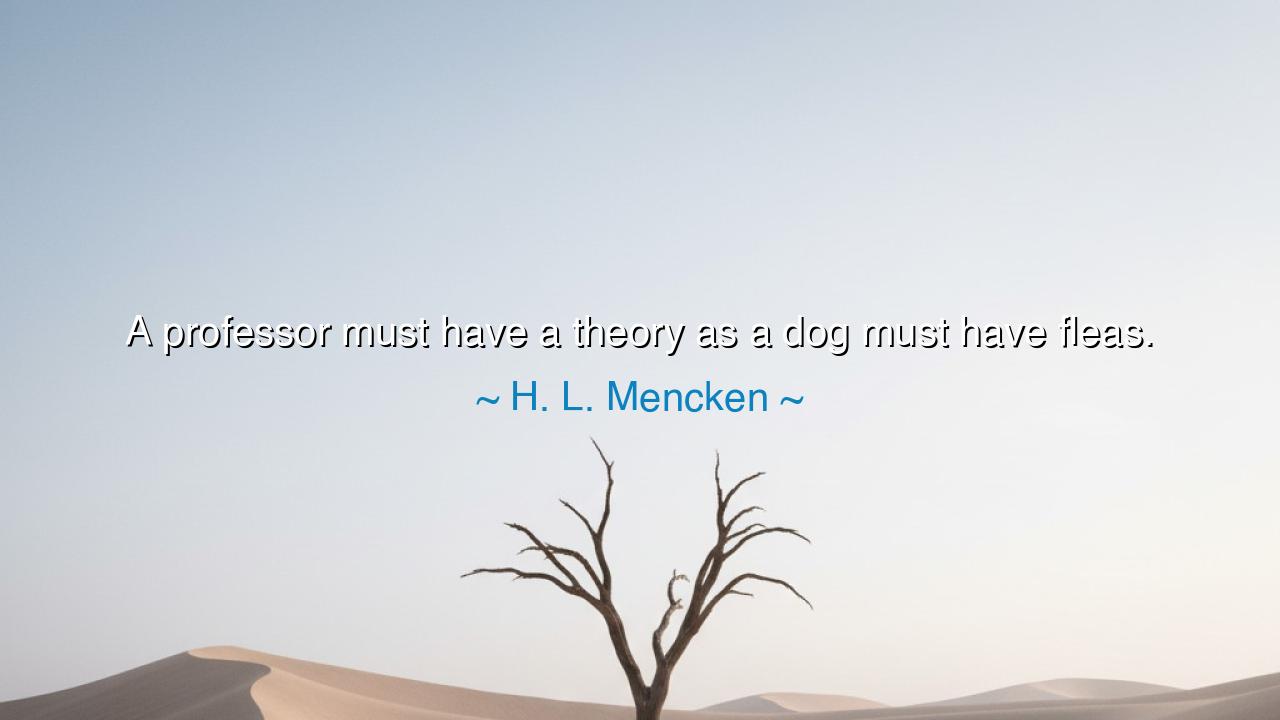
A professor must have a theory as a dog must have fleas.






Hear the sharp tongue of H. L. Mencken, master of satire, who declared: “A professor must have a theory as a dog must have fleas.” These words sting, yet they reveal a profound truth about the nature of intellect and human vanity. For Mencken, who loved to expose pretension, saw that in the halls of learning, the professor is rarely content without a system, a doctrine, a lens through which all the world is explained. Just as the dog cannot help but carry fleas, so too the scholar cannot resist carrying a theory, whether useful or absurd.
The origin of this saying lies in Mencken’s ceaseless battle against hollow intellectualism. He admired thought, but despised arrogance. To him, the professor was often more concerned with preserving a personal theory than with seeking truth itself. Theories can enlighten, but they can also bind. They cling to the mind, itch at it, and sometimes irritate those around. Yet Mencken did not mean this merely as mockery; he meant it also as recognition. The habit of theorizing is as natural to scholars as scratching is to the dog. It is both their curse and their nature.
Consider the story of Sigmund Freud, who looked upon the human mind and spun a theory of hidden desires and dreams. His ideas spread like fire, igniting new disciplines, reshaping art, literature, and culture. Yet even as his theories enlightened, they also constrained; they became a net through which all human behavior was filtered. For some, they were salvation; for others, irritation. Freud, like Mencken’s dog, could not help but carry his fleas—a theory always clinging, always shaping how he saw the world.
History shows us, too, the danger of the unchecked professor’s theory. In the Middle Ages, scholars clung to Aristotle’s doctrine that heavier objects fall faster than lighter ones. It was Galileo, bold enough to test with experiment, who cast aside the itch of false theory and revealed truth. Here we see that while the professor must have his theory, wisdom lies in remembering that fleas may bite, and sometimes must be brushed away.
The meaning of Mencken’s words, then, is twofold. On one hand, it is a jest at the expense of the learned, mocking their endless theorizing. On the other, it is a recognition of human nature: we all seek patterns, explanations, systems. To live without theory is to wander in chaos. Yet to cling too tightly to theory is to risk blindness. The professor who forgets this becomes the dog scratching endlessly, never at peace.
The lesson for you, listener, is clear: respect theories, but do not worship them. Understand that systems of thought are tools, not prisons. A theory should illuminate, not suffocate. Test it, refine it, discard it if need be—but never allow it to consume your mind entirely. The wise man uses theories as a sailor uses maps: to guide, not to enslave.
Practical actions follow. Be wary of clinging too tightly to any one explanation. Read widely, listen humbly, and remain ready to release what no longer serves truth. If you are a teacher, remind your students that theories are ladders, not chains; they help us climb, but must sometimes be left behind. If you are a learner, question every system, even those you love most, for in questioning lies freedom.
Thus remember Mencken’s jest: “A professor must have a theory as a dog must have fleas.” Laugh at it, but learn from it. Theories are inevitable, but let them not master you. Carry them lightly, examine them often, and know when to brush them away. In this balance lies true wisdom, and in this humility lies the path to truth.






AAdministratorAdministrator
Welcome, honored guests. Please leave a comment, we will respond soon